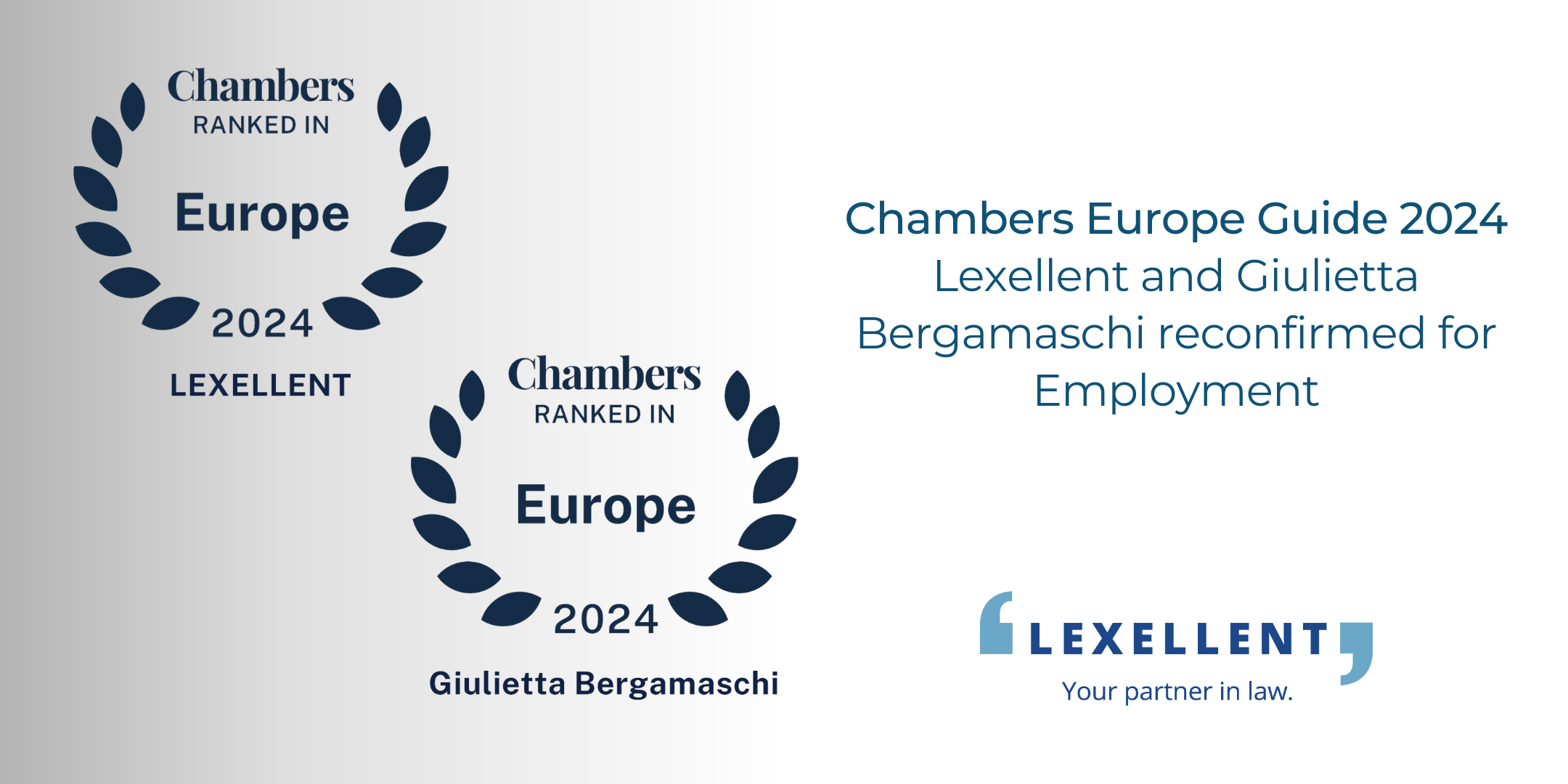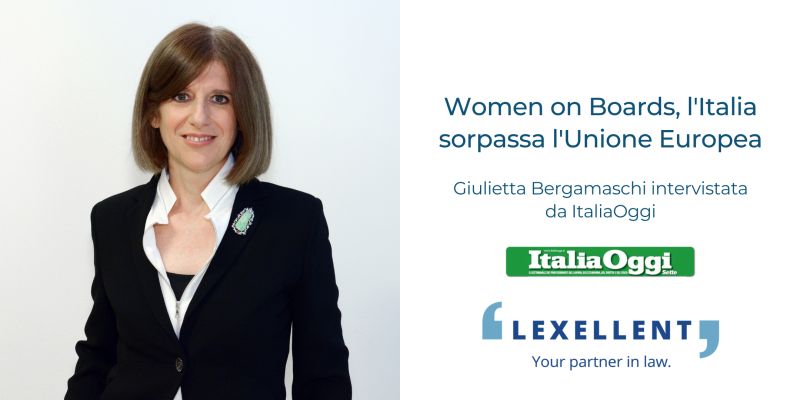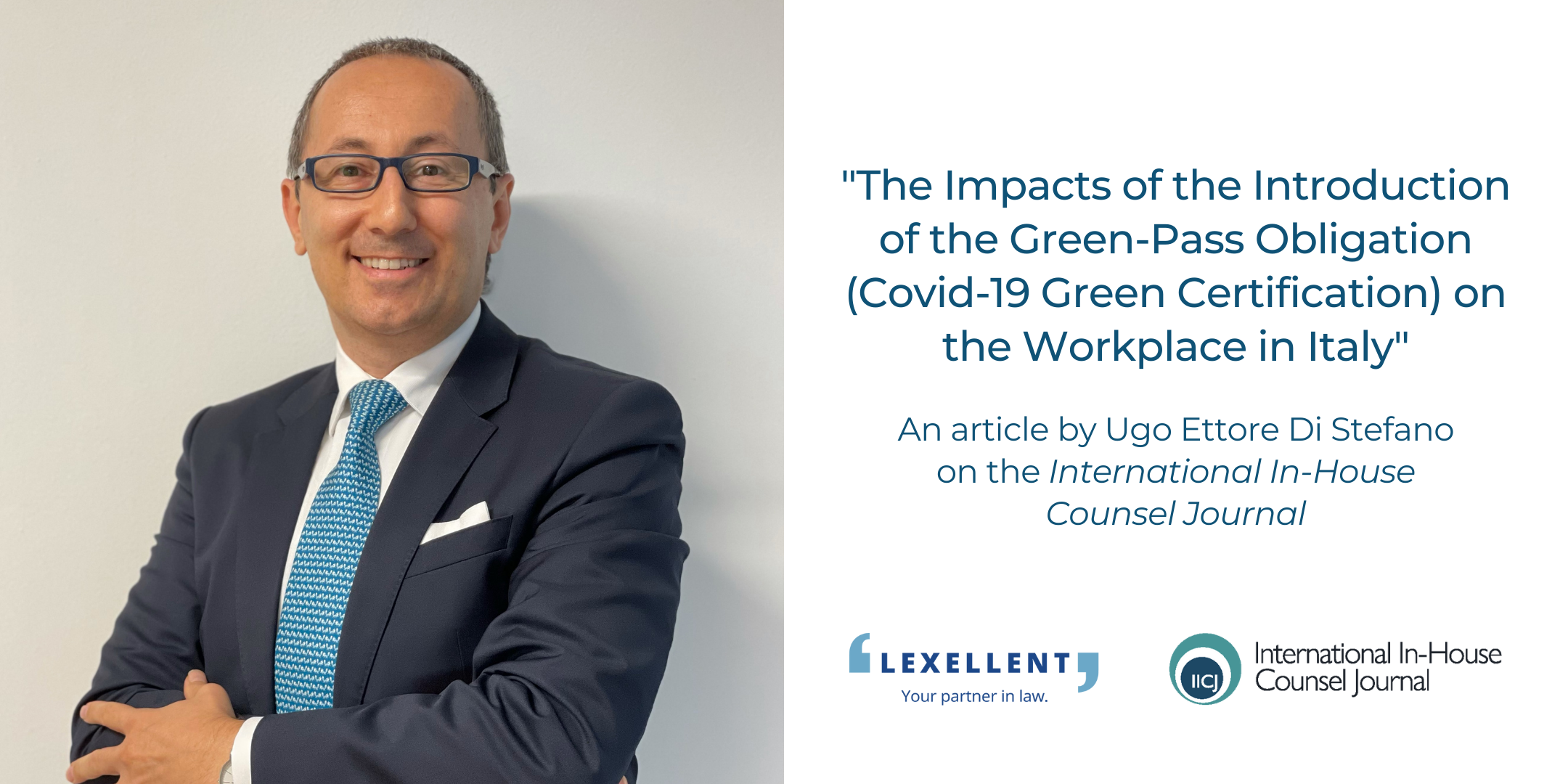We are delighted to announce that once again this year our firm and our Managing Partner Giulietta Bergamaschi have been confirmed in the Europe 2024 ranking of Chambers and Partners, Employment.
We thank our clients for the trust they place in us!

We are delighted to announce that once again this year our firm and our Managing Partner Giulietta Bergamaschi have been confirmed in the Europe 2024 ranking of Chambers and Partners, Employment.
We thank our clients for the trust they place in us!

Durante la quarta edizione del Welfare & HR Summit, evento digitale de Il Sole 24 Ore dedicato alle novità nel mercato del lavoro, con focus sul futuro delle aziende e sul ruolo della direzione del personale, è intervenuta anche la nostra Managing Partner Giulietta Bergamaschi.
Giulietta ha discusso della Certificazione della parità di genere nelle aziende quale misura per ridurre il divario di genere in relazione alle opportunità di crescita, alla parità salariale a parità di mansioni, alle politiche di gestione delle differenze di genere e alla tutela della maternità.
Ha inoltre illustrato una recente survey promossa da Lexellent e rivolta alle imprese con l’obiettivo di testare il loro sentiment su tale nuovo istituto.

Scheduled for 23 February next, the fourth edition of the Welfare & HR Summit, the eagerly awaited digital event by Il Sole 24 Ore dedicated to innovations in the labour market, with a focus on the future of companies and the role of HR management.
The topics are numerous and urgent, Lexellent will be there, with a speech by Giulietta Bergamaschi on gender equality certification: the rules and benefits for companies and workers.
The event is free, don’t miss it!

Sul numero odierno di ItaliaOggi un interessante approfondimento sulle ultime novità normative in tema di equilibrio di genere nelle emittenti quotate.
Lo scorso 7 dicembre è stata infatti pubblicata sulla Gazzetta Ufficiale dell’Unione Europa la direttiva n. 2022/2381 (c.d. “Women on Boards”), che obbliga tutti gli Stati membri a introdurre criteri di selezione trasparente per giungere, entro la fine di giugno 2026, all’obiettivo di attribuire alle donne il 40% dei posti di amministratore senza incarichi esecutivi e il 33% di tutti i posti di amministratore in società quotate.
Tra gli intervistati anche la nostra Giulietta Bergamaschi, che ha osservato come «(…) la nuova disciplina Ue ponga degli obiettivi oggi già raggiunti sulla scorta di previsioni vigenti nel nostro ordinamento». Infatti, la L. 120/2011 (c.d. “Golfo – Mosca”), per i rinnovi dei CC. dd. AA. delle emittenti quotate successivi al gennaio 2020, ha riservato al genere meno rappresentato la quota di 2/5, pari quindi al 40% dei componenti, tanto che già a partire dalla fine del 2021 nel nostro Paese si è raggiunto il massimo storico del 41% di presenza femminile negli organi di amministrazione.
Per leggere l’approfondimento completo:

On December 12th 2022, the Italian Government transmitted to the Chamber of Deputies the draft of legislative decree for the implementation of Directive (EU) 2019/1937, concerning the protection of individuals who report violations of EU law (so-called whistleblowers) and containing provisions about the protection of individuals who report violations of national regulatory provisions.
The text had been approved by the Council of Ministers on December 9th 2022 – one day before the deadline of 3 months after the implementation of the enabling Law no. 127 dated August 4th 2022 – and was promptly assigned to the competent parliamentary commissions (II – Justice, XI – Labour, V – Financial statement and Treasury and XIV – EU policies), which will have until January 19th 2023 to make their assessments.
The Directive, provides for the obligation to adopt internal reporting channels exist for the following entities:
Reports can be made through three different channels: internal, external andthrough public disclosure.
In Italy, the phenomenon of whistleblowing was already contemplated and regulated, both for the public and private sectors, by Law 179/2017, which will therefore be superseded in case of approval of the decree.
The main innovations with respect to the provisions currently in force concern the private sector.
In fact, whereas for public employees the Italian legislation is mostly aligned with EU law, the protection of whistleblowers in the private sector is currently very limited, as it applies only to employees and collaborators of private entities that have adopted the organization model pursuant to legislative decree 8 June 2001, n. 231 and only in relation to relevant offenses according to said decree.
The new regulation being examined by the Chamber instead concerns, in line with the provisions of the Directive, both all private entities with at least 50 employees and those operating in certain sectors and which adopt organization and management models pursuant to legislative decree 8 June 2001, n. 231, regardless of the number of their employees.
From an objective point of view, the new legislation would apply with regard to the following categories of offences:
As for the channels of reporting, consistently with the EU provisions, the following are provided:
In order to protect whistleblowers, the following protective measures are provided:
A) Pecuniary Sanctions:
B) Disciplinary Sanctions
For the same purpose of protecting whistleblowers, there is an obligation of confidentiality (art. 12) regarding the whistleblowers’ identity, which cannot be revealed or divulged, without their express consent, to authorities other than those competent to receive or follow up on the report.
This obligation is already provided by art. 54 bis, paragraph 3, of Legislative Decree 165/2001. The main change, however, concerns the need for consent to be express, as required by the EU Directive.
In the event of disclosure of the whistleblowers’ identity, aprior written communication of the reasons for the disclosure of the confidential data must be given.
A protection equal to that granted to whistleblowers is also provided for the individuals involved and or mentioned in the report, including the reported person himself.
Finally, all those involved have the right to an effective remedy system, to an impartial judge, to the presumption of innocence and to a more general right of defense.
“The directive regulates the protection of whistleblowers (or ‘segnalanti’ in the Italian translation of the text) within the Union, through minimum protection standards, aimed at standardizing national regulations, taking into account that those who report threats or prejudices to the public interest of which they have come to know in the course of their professional activities are exercising the right to freedom of expression. The purpose of the rules is to strengthen the principles of transparency and accountability and to prevent the commission of crimes.
The scope is limited to violations of Community legislation in the sectors expressly indicated (including: public procurement, financial services, product and transport safety, environment, food, public health, privacy, network and IT systems security, competition). The directive provides for protection for the whistleblower without differentiating between the public sector and the private sector.
In addition to the obligation of confidentiality regarding the identity of the whistleblower, the persons involved and the person reported, there is a prohibition of retaliation, with an example of retaliatory cases, and support measures in favor of the whistleblower, which consist of information, assistance and free advice on the rights of the person involved and on the methods and conditions of access to legal aid”. Finally, the Chairman of National Anti-Corruption Authority (ANAC) G. Busia, stated as follows:
“The protection of whistleblowers is a fundamental right, recognized internationally, and an extension of the right to freedom of expression. Preserving whistleblowers from retaliatory behavior is the imperative of the Authority: those who responsibly report any irregularities know they can find protection, without fearing retaliation from their superiors. Therefore, the strengthening of these powers of the Authority by the government is welcome, as well as the expansion of the scope of application, as requested by the European Union”.
At this link it is possible to download some overview slides

On Monday, July 11, our first concert in attendance was held at the Fondazione Stelline.
The custom of greeting our clients and friends before a major break, such as the summer one, was born in 2020, in the wake of the pandemic emergency, when we were ingenious to find a way to make our closeness felt to the people we could not receive.
The resounding success has prompted us to make our concerts a recurring event in the way we present ourselves to the community.
If being sustainable also means having a social and cultural impact in one’s area of influence, we, who deal with labor law – going through health, safety, environment, social responsibility and organizational well-being -, think that acting responsibly means putting these elements into practice first.
Organizing this concert interprets our idea of sustainability, meaning attention to people and community well-being, with the awareness of our role in the local and global context.
Special thanks to Fondazione Stelline, I Pomeriggi Musicali and the string quartet composed of Maestros Aurora Bisanti and Gabriele Schiavi on violins, Francesca Turcato on viola and Fabio Fausone on cello.













Yesterday, 16 March 2023, the new Chambers Europe Guide 2023 by Chambers & Partners was published.
Once again this year, the prestigious international directory has included our Managing Partner Giulietta Bergamaschi and Lexellent among its outstanding professionals and law firms, respectively, for the Employment – Italy category.
According to Chambers, Giulietta Bergamaschi, among the outstanding professionals in Band 4, “She is always to the point and to the core of matters. She is direct, straightforward and always available.“

Again this year, the prestigious international directory Chambers & Partners confirms Lexellent’s position among the boutiques of excellence in employment law, including it in the Employment Italy ranking, Band 5.
Congratulations also to our managing partner Giulietta Bergamaschi, who has also been confirmed as one of the top lawyers in Band 4 with the following motivation:
Giulietta Bergamaschi provides assistance to clients with restructuring and reorganisation procedures, alongside advising on executive dismissals and health and safety matters. She additionally deals with trade union negotiations. One source says: “She is a smart lawyer, and I admire her strength in leading the firm.”

On the International In-House Counsel Journal, an article by Ugo Ettore Di Stefano, Partner at Lexellent, and Andrea D’Agostino, Legal Counsel Europe at The Coca-Cola Company, about the consequences of the Green-Pass obligation on the workplace in Italy.
***
“The EU Digital COVID Certificate (formerly called Digital Green Certificate) is a digital proof that a person has either (i) been vaccinated against COVID-19, (ii) received a negative test result or (iii) recovered from COVID-19. The scope of the EU Digital COVID Certificate is to facilitate safe free movement during the COVID-19 pandemic within the EU. The certificate can be used across all EU Member States as well as in Iceland, Liechtenstein and Norway. Contacts are also ongoing to enable its use with Switzerland.”

Lexellent è lieto di invitarvi al suo consueto Concerto di Natale in live streaming, che vedrà l’esibizione del Quartetto d’archi dell’Orchestra I Pomeriggi Musicali nei seguenti componimenti:
– Antonín Dvořák, Americano, Quartetto d’archi, op. 12 in F major. Op. 96
– Astor Piazzolla Chant et Fugue, Oblivion, Tango Ballet
– Silent night First Noelle Angels we have Heard on High
L’evento si terrà il 20 dicembre dalle ore 18:00.
Sarà possibile assistere alla performance direttamente da questa pagina!
Vi aspettiamo per un momento di buona musica insieme!

Lexellent è lieto di invitarvi al suo Concerto d’Estate in live streaming, che vedrà l’esibizione del Quartetto d’archi dell’Orchestra I Pomeriggi Musicali, Continue reading “Evento estivo in diretta streaming: quartetto d’archi dei Pomeriggi Musicali”